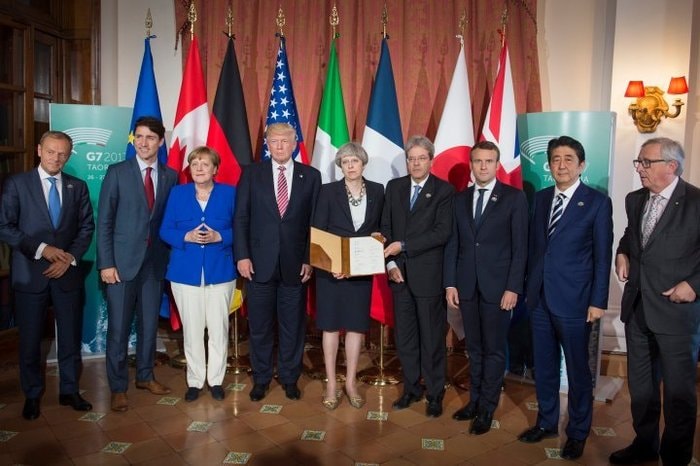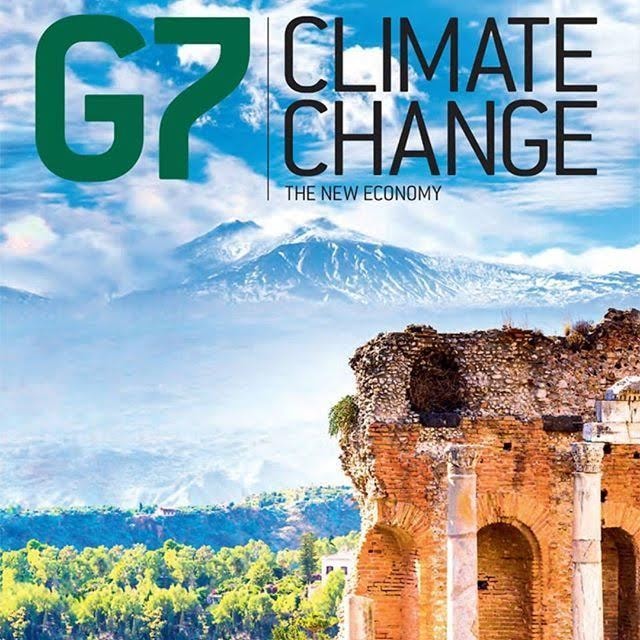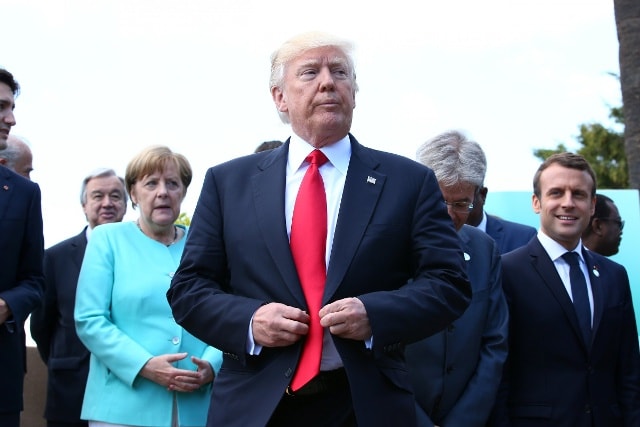G7 Summit: Joint statement difficult to fill disagreements
(Baonghean) - Last weekend, the Group of Seven (G7) Summit took place in the city of Taormina on the island of Sicily, Italy.
Although a joint statement was issued on a number of issues, the agreement still could not overcome the disagreements and conflicts that exist among member countries, especially the United States.
Rare consensus on security
In the context of terrorism spreading everywhere around the world, security and counter-terrorism issues have become a common concern of all 7 G7 member countries at this summit.
Taking place right after the suicide bombing in the UK that killed 22 people and injured more than 100 others, at the beginning, Italian Prime Minister Paolo Gentiloni emphasized that this Conference must issue a common statement on fighting terrorism and ensuring security to meet the expectations of people around the world.
 |
| Leaders of countries attending the G7 Conference. |
As expected, on the first day of the conference, delegates of the G7 group adopted a 15-point Joint Statement on the fight against terrorism and violent extremism.
Regardless of terrorist acts against G7 members or other countries and regions, the joint statement stressed that the G7 group considers counter-terrorism a key priority and will together take the toughest actions to "search for, identify, eliminate and punish all terrorists and their supporters".
Notably, the statement also called on internet service providers and social networks to make greater efforts in preventing content that incites and spreads extremist ideologies of terrorists.
This consensus is easy to explain, because the increasingly sophisticated transformation of terrorist forces makes all governments, including the US and European countries, extremely confused.
A series of lone wolves targeting civilians, public places, homemade bombs… can appear anywhere, anytime they want. In that context, only solidarity, information sharing, and joint action can help stop the octopus tentacles of extremist terrorism.
The conference also reached consensus on several other issues related to regional security, such as the nuclear issue on the Korean peninsula or the situation in the East Sea and the East China Sea.
Specifically, the G7 declared its readiness to increase measures to deal with the North Korean issue if the country does not give up its nuclear programs.
The G7 joint statement also expressed concern about the situation in the East Sea and the East China Sea, and called for demilitarization on “disputed entities”.
Full of disagreement
Despite the consensus on security and counter-terrorism, this conference is still considered to have the most conflicts and challenges in many years. This is the assertion of President of the European Council (EC) Donald Tusk when mentioning the "cornerstones" such as the climate agreement, trade protection issues or immigration.
The disagreements could not be hidden when the leaders of the countries could not convince US President Donald Trump to support the Paris Agreement on climate change. The public must still remember that during the presidential election, Donald Trump affirmed that he would withdraw from this agreement, claiming that it was harmful to American companies.
Keeping his promise, on March 28, the US President signed an executive order on energy independence to review former President Barack Obama's climate legacy, including the Paris Agreement.
 |
| Climate change is one of the controversial topics at this G7 Summit. |
In addition, the issue of migrants has also sparked disagreements regarding the ban on people from six countries with large Muslim populations. Although the G7 leaders have had direct talks with five African countries: Ethiopia, Kenya, Niger, Nigeria, Tunisia - the destinations and transit points for hundreds of thousands of migrants to Europe; a joint statement on this issue has not been issued.
Of course, everyone understands that the problem with the US President’s immigration decree will have to be adjusted. Meanwhile, how the responsibility of the “destination” countries in Europe for the “origin points” from Africa and the Middle East will be distributed is still an unanswered question.
Fundamental solutions such as helping African countries develop their economies and attracting young generations to return to their homeland are also not feasible.
Another prominent conflict that must be mentioned is the issue of trade protectionism. The public knows that the stance of the US President Donald Trump's administration in recent times is anti-globalization and in favor of protectionism.
Perhaps the leaders of the remaining 6 countries in the G7 had anticipated this situation and put pressure on the US. As a result, President Donald Trump finally agreed to the group's joint statement on re-commitment to expanding markets and "fighting protectionism".
However, agreeing is one thing, the reality is another. The G7 will still have to wait anxiously for what will happen next.
Discord with NATO
 |
| US President Donald Trump's first appearance at the G7 Summit has become the center of attention (Source: Reuters) |
Not only overshadowed by a series of thorny and contradictory issues, most G7 members, who are also members of NATO, are also restless with the recent speech of US President Donald Trump.
The US President criticized the unfair contributions of members while avoiding mentioning Article 5 of the NATO Charter, which requires countries in the bloc to defend each other in case one member is attacked.
This statement may be making the relationship between the US and NATO more distant than ever. But at the same time, according to observers, it could also make the US's position in this bloc shaky.
With what was shown at the recent Summit, it is clear that a joint statement of the G7 group is more of a formality than a reality. Everyone can see the "face but not the heart" of the leaders attending this conference.
In particular, if the US Government of President Donald Trump remains steadfast in its previous commitments and statements on climate change, immigration or trade protectionism, the upcoming journey of solidarity and unity of the G7 will be extremely difficult!
Phuong Hoa
| RELATED NEWS |
|---|
